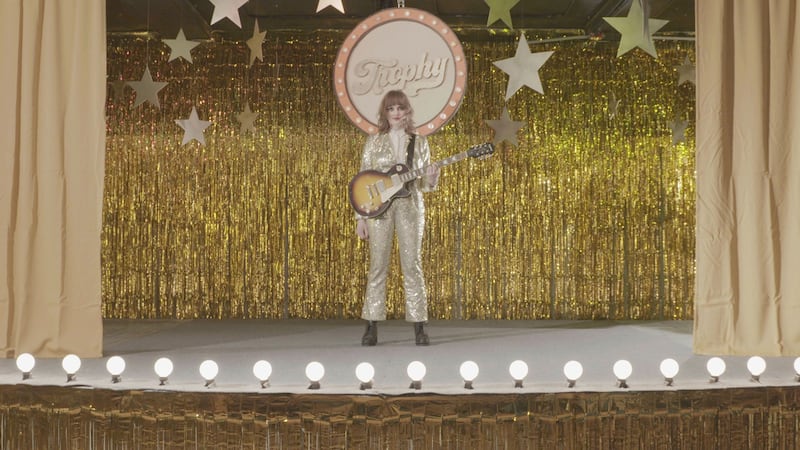When Kate Davis plays Portland this week, she'll be returning to her hometown as an entirely different artist than she was when she first left.
"I always feel a little wary about coming back and performing," says the 28-year-old musician, "because certain people aren't aware of my changing, or are unwilling to accept it."
Until recently, Davis, who currently lives in New York City, has made her career as a cocktail dress-wearing jazz singer and double bassist. But on her new album, Trophy, she's pivoted to full-blown indie-rocker, trading vocal jazz in the tradition of Ella Fitzgerald and Billie Holiday for introspective songwriting in the tradition of Liz Phair.
Released in November, Trophy is a romp through adolescent emotions, powered by jangly guitars and dreamy vocals. Davis' midcentury drawl now sounds closer to the soaring lilt of the Cranberries' Niall Quinn. On "Dirty Teenager," she sings about college kids pounding Miller Lites in dorm rooms and "reeking of tobacco and egg and cheese." The lackadaisical "Cloud" recalls what it's like to be 18 and hopelessly in love: "Wading through the sea of love has become a chore/A bore without you."
Trophy has already garnered praise from Pitchfork and Paste. It's not Davis' first indie hit, either: She co-wrote Sharon Van Etten's "Seventeen," which was released at the beginning of this year.
Still, Trophy is a far cry from the music Davis was making when she left Portland a decade ago on a full-ride scholarship to study upright bass at the Manhattan School of Music.
Davis' career began in Oregon, where she attended West Linn High School, played in the Portland Youth Philharmonic and was a Presidential Scholar in the Arts. She went on to a successful career in the New York City jazz scene, playing at Lincoln Center and Carnegie Hall. She signed with a label after her cover of Meghan Trainor's "All About That Bass" gained more than 18 million views on YouTube.
All the while, Davis was drifting away from the career trajectory her parents and mentors had always wanted for her.
"With jazz music, it wasn't so much about the emotional," she says. "It was, 'Hey, if you learn this mathematical equation, you can play a line that sounds crazy,' and I would find myself asking the same question over and over: why?"
It started in 2009, when Davis heard St. Vincent's Actor and realized that was the direction she wanted to go: a woman who sang and wrote raw, personal music that felt relevant and cool.
"I was coming from a world where I was singing old music and old standards," she says, "feeling like I was playing a character, putting on a cocktail dress."
In college, she started realizing there was a lot she didn't like about the culture of institutionalized jazz, including its misogyny, and that there was "a lot of lineage where it was never even supposed to be played by white people." So she began experimenting with different types of music, while still getting opportunities as a jazz bassist and singer.
"I had to try to stay on the moving train, while having a secret life trying to create the music I wasn't ashamed of and felt like actually represented me," she says. "So that's why, for me, having Trophy come out is very significant. It's the first significant marker of me saying everything I need to say, without the influence of parents, teachers or mentors, or anybody who had some idea of how I should be making music, living my life or developing a career."
Trophy is both melancholy and empowering, as nostalgic as driving at night with the windows down. Davis' musical virtuosity is evident in the five instruments she plays on the album, and in her quietly powerful string and horn arrangements. Her voice is full of sincere emotion—Davis has something to say, and the talent to know how to say it.
The album recalls the music Davis has always loved: Metric, Broken Social Scene, Elliott Smith, and TV on the Radio, to name a few. But its intimacy and fierceness are more in line with the indie-pop queens who have defined this decade, like Lucy Dacus, Sharon Van Etten, and Courtney Barnett. But make no mistake—Trophy isn't another genre study.
"There's a spirit in indie rock that is liberating and says, 'Screw you guys,'" says Davis. "I think I was in that place for so long and not able to truly express it that I think it's natural it came out this way."
In fact, Davis has never felt more like herself.
"I can finally stand up something tangible that people can listen to and understand where I'm at and what I'm saying and how I'd like to represent myself," she says. "This is the strongest I've felt coming back."
SEE IT: Kate Davis plays Polaris Hall, 635 N Killingsworth Court, polarishall.com, with Pool Boys, on Thursday, Dec. 5. 8 pm. $15 advance, $17 day of show. 21+.
